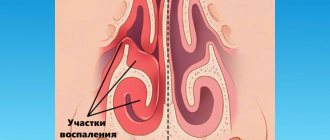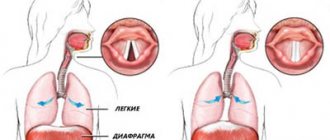How to cure a runny nose? Yandex, Google, thousands of doctors and pharmacists answer this question countless times every day. A runny nose (or rhinitis) is an inflammation of the nasal mucosa due to exposure to cold, bacteria or viruses, and the influence of allergens. The cells of the mucous membrane constantly produce secretions that protect the respiratory organs from adverse effects. When this secretion becomes too much and snot flows like a stream, we realize that we are sick and begin to look for remedies for rhinitis.
How to cure a runny nose when there is absolutely no time to get sick?
How to treat a runny nose: the best drops and sprays.
June 16, 2022
27311
4.1
2
Content
- Causes and symptoms of a runny nose
- Remedies for the common cold: what are they?
- Top 7 best remedies for runny nose
- Aqua Maris Plus
- Galazolin
- Nazivin
- Isofra
- Sanorin
- Vibrocil
The most unpleasant thing during a cold, besides fever, is, of course, nasal congestion. When we cannot breathe normally, it interferes with both normal work and proper sleep. What will help get rid of a runny nose? Here is our list of the most effective drugs for rhinitis.
Causes and symptoms of a runny nose
Among the main causes of runny nose
the following can be distinguished:
- hypothermia (cold rhinitis);
- infection (bacteria or viruses) entering the body;
- allergens (plant pollen, household dust, animal hair, chemicals, etc.);
- hormonal disorders.
Symptoms of a runny nose:
- the nose does not breathe freely;
- possible frequent sneezing;
- ears are blocked;
- headache;
- burning and dryness in the nose;
- severe nasal congestion;
- no sensitivity to odors;
- mucous discharge from the nose.
How to cure chronic runny nose?
To determine the cause of a chronic runny nose, you need to do:
- rhinoscopy, x-ray or tomography of the paranasal sinuses - this will help to find out whether there is pus in them and where it is localized;
- general and biochemical blood tests, general urine analysis;
- allergy tests, studies on the levels of immunoglobulins in the blood;
- bacterial cultures from the nose, nasopharynx, and tonsils.
After the doctor finds out the cause of the runny nose, he prescribes antibacterial or antihistamines, explains how to cleanse your nose in your case, and recommends physiotherapy.
Medicines for prolonged rhinitis are selected after a thorough examination
Remedies for the common cold: what are they?
Depending on the causes of the runny nose, you need to choose the right remedy to treat it. By the way, some drops for the common cold (antibacterial and hormonal) are sold in pharmacies with a prescription. They have certain side effects, so such remedies for the common cold should only be prescribed by a doctor. So, what are the remedies for treating a runny nose?
- Means for rinsing the nose.
Such solutions have antimicrobial, anti-inflammatory and antiseptic effects. By the way, you can prepare them yourself (a weak aqueous solution of soda, soda or furatsilin, chamomile decoction, etc.). Or you can buy a ready-made drug at the pharmacy: miramistin, saline solution, chlorhexidine. When you have a runny nose, seawater-based products are also very popular for rinsing the nose - they reduce swelling and improve breathing. - Vasoconstrictors.
Such drops and sprays for a runny nose constrict the vessels of the nasal mucosa, thereby reducing their permeability and relieving swelling. Vasoconstrictor nasal drops are prescribed for vasomotor, infectious or allergic rhinitis, but for a short period of time. If you use vasoconstrictor drops for a long time, addiction occurs. - Antiallergic (antihistamine).
Such remedies for the common cold protect cells from destruction, which releases histamine (a substance that provokes an allergic reaction). Allergic rhinitis is usually treated with tablets, but nasal drops are also available. You can also combine: tablets and drops for allergies.
The most unpleasant thing during a cold or allergy is nasal congestionGetty Images/Brand X
- Antibacterial.
Such drops or sprays for a runny nose are prescribed only if the cause of a runny nose is a bacterial infection. Treating viral or allergic rhinitis with antibacterial drops is not only useless, but also dangerous. Antibacterial nasal drops are usually only available with a prescription and can only be prescribed by a doctor. So don’t self-medicate to avoid harming yourself! - Hormonal.
Similar remedies for the common cold are used if a person has a severe form of allergic rhinitis due to inflammation of the paranasal sinuses. Hormonal nasal drops are not addictive, but have a bunch of side effects. Therefore, only a doctor prescribes such drugs for the common cold. - Combined.
Such remedies for the common cold contain active substances aimed at eliminating several problems. For example, they constrict blood vessels and relieve an allergic reaction. These drugs for the common cold are good because you buy one product instead of two or three. But if it contains a hormone or antibiotic, you will need a prescription from a doctor.
How to cure allergic rhinitis?
Combating allergic rhinitis requires not only the use of nasal decongestants, but also lifestyle changes. The main rule is to completely eliminate the influence of the allergen on the body or reduce contact with it to a minimum. To do this you need:
- if you are allergic to pollen or grass, go outside as little as possible and visit green areas, especially when plants are in flowering;
- at the peak time for the concentration of allergens in the air, cover open windows with damp gauze and periodically renew it;
- wear glasses, gloves, closed clothing;
- frequently rinse your nose with saline solutions and rinse your mouth;
- after each walk, take a shower and put on new clothes;
- do wet cleaning as often as possible;
- purify the air with filters;
- dry washed items indoors and not on the balcony;
- exclude the most allergenic foods from the diet: nuts, strawberries, tomatoes, honey, eggs, seafood, chocolate, citrus fruits, certain types of fish.
The most reliable remedy for allergic rhinitis is to eliminate the allergen
Medications against runny nose caused by allergens:
- Antihistamines. They can be used as nasal sprays, drops or tablets. Sprays have minimal side effects. Drops and tablets systemically block the allergic reaction.
- Glucocorticoids. For allergies, these substances are applied topically to eliminate inflammation. They are prescribed in combination with antihistamines and even in cases where they are ineffective. Modern glucocorticoids (for example, drugs with the active ingredient mometasone furoate Nasonex sinus, Flix) can be used for a long time without fear of developing addiction.
If you have passed a lot of tests, and doctors still do not understand how to cure your persistent runny nose, consult a gastroenterologist. Perhaps the swelling of the mucous membrane is caused by malfunctions of the digestive system.
Please note: when your nose is stuffy, you should not:
- draw mucus in and swallow it. It contains viruses, bacteria, inflammatory products that should be removed from the body, and not “run further”;
- Prevent sneezing by pinching your nose. If a reflex sneeze cannot be avoided, mucus will go into the ears, and otitis will be added to the runny nose;
- use cloth handkerchiefs. It is better to use soft disposable paper napkins and wash your hands and face after blowing your nose.
Use disposable handkerchiefs - they are hygienic
Aqua Maris Plus
This remedy for the common cold is excellent for maintaining the physiological state of the nasal mucosa. "Aqua Maris Plus" for the nose is created on the basis of sterilized water of the Adriatic Sea with natural microelements. The drug thins mucus and normalizes its production. Microelements in the composition of Aqua Maris nasal drops improve the functioning of the ciliated epithelium, relieve inflammation in the nose, cleanse the mucous membrane and restore it. Aqua Maris Plus, a remedy for the common cold, washes away allergens from the nasal mucosa and reduces inflammation. For hygienic purposes, drops are used to cleanse the nasal mucosa from street and house dust, as well as to moisturize the mucous membrane and soften crusts in the nose in children.
"Aqua Maris" is prescribed for acute and chronic inflammatory processes of the paranasal sinuses, adenoiditis, after operations on the nasal cavity, for vasomotor and allergic rhinitis, during pregnancy and breastfeeding, for dry nasal mucosa in air-conditioned rooms or during the heating season , in dusty rooms, etc.
Aqua Maris Plus
Jadran-Galenski Laboratories, Croatia
For the treatment and prevention of atrophic and subatrophic rhinitis;
- for cleansing and moisturizing the nasal mucosa in inflammatory diseases of the nasal cavity, sinuses and nasopharynx, incl. pregnant women and during lactation; - in the complex therapy of allergic and vasomotor rhinitis (especially for persons predisposed or suffering from hypersensitivity to drugs, including pregnant women and during lactation); — for the prevention of infections of the nasal cavity in the autumn-winter period (including for pregnant women and during lactation); - patients suffering from dry nasal mucosa and persons living and working in rooms with air conditioning and/or central heating, in order to preserve the physiological characteristics of the nasal mucosa in altered microclimatic conditions; - people whose mucous membranes of the upper respiratory tract are constantly exposed to harmful influences (smokers, vehicle drivers, people working from 110
5.0 1 review
693
- Like
- Write a review
Sources
- Ogra PL, Welliver RC, Riepenhoff-Talty M. Local immune response to viral antigens. Human immunity to viruses. - New York: Academic Press, 1983. - R. 81-99;
- 21st Congress of European Rhinologic Society (ERS) and 25th International Symposium on Infection and Allergy of the Nose (ISIAN). - Tampere, Finland, 2006, June 11-15;
- Karpova E.P. Rhinitis in childhood // Attending physician. - 2010. - No. 1;
- Volosovets A.P., Krivopustov S.P., Molochek A.I., Po-pivchak P.M. The value of 0.65% sodium chloride solution in the prevention and treatment of diseases of the nasal cavity in children // Child’s Health. - 2008. - No. 5(14). - pp. 23-28;
- Igarashi Y, Skoner DP, Doyle WJ et al. Analysis of nasal secretions during experimental rhinovirus upper respiratory infections // J. Allergy Clin. Immunol. - 1993. - No. 5. - P. 722-731.
Runny nose and medications
Galazolin
Galazolin nasal drops are great help even with a severe runny nose, when it is difficult to breathe. This remedy for the common cold helps to quickly relieve nasal congestion, reducing swelling of the mucous membrane. “Galazolin” for a runny nose is suitable as an “ambulance” for a runny nose if your nose is stuffy in the evening, but you can only get to the doctor in the morning. "Galazolin" relieves inflammation of the Eustachian tube and widens the passages so that air can pass freely. After using these drops for a runny nose, breathing immediately improves without producing a lot of mucus. The positive effect lasts about six hours. At the same time, doctors do not recommend using Galazolin nasal drops for a long time, so as not to develop an addictive effect.
The active substance of this remedy for the common cold is xylometazoline hydrochloride. Allergies to it do not develop, so even pregnant and lactating women can use Galazolin. If you follow the correct dosage of the drug, the active substance is practically not absorbed into the blood.
Galazolin
Medana Pharma SA (Medana Pharma), Poland
Under the influence of Galazolin, arterial vessels narrow.
As a result, the swelling of the mucous membrane of the nasal passages decreases, and the amount of discharge decreases. Relieving swelling helps restore patency of the nasal passages, Eustachian tube and sinus openings. After using Galazolin, the effect develops after 5-10 minutes. The duration of the vasoconstrictor effect is 8-12 hours. If the dosage is observed, clinically significant absorption of the drug is usually not observed. from 28
5.0 1 review
1032
- Like
- Write a review
Naphthyzin
A fast-acting vasoconstrictor for infectious rhinitis, hay fever, and sinusitis accompanied by debt. The drops almost instantly reduce the lumen of the capillaries; after just a minute of their use, breathing becomes freer. The effect lasts up to 6–8 hours. It is necessary to use Naphthyzin only when there is severe congestion, for example, at night. The course is no more than 5 days. Long-term use can cause addiction and decrease the sensitivity of blood vessels to the active substance. Naphthyzin should be used especially carefully in children. To eliminate a runny nose, it is allowed from 1 year.
Nazivin
This remedy for the common cold is available in several versions: in the usual dosage, for children of different ages, for those who suffer from allergies or are prone to it. “Nazivin” perfectly treats a runny nose, having a vasoconstrictor effect, and it acts immediately after use - the nose begins to breathe normally, health improves, and the secretion of mucus from the nose decreases. Ear congestion, which so often accompanies a runny nose, goes away. "Nasivin" for the nose helps prevent the development of otitis, sinusitis or eustacheitis.
These drops and nasal spray contain the optimal concentration of the active substance (oxymetazoline hydrochloride), which helps prevent addiction to Nazivin. After one instillation, the positive effect lasts for about 12 hours. But you need to be careful and not overdose on Nazivin (this can cause even more nasal congestion and even increased blood pressure).
Nazivin
Merkle GmbH, Germany
— treatment of acute respiratory diseases accompanied by rhinitis;
- allergic rhinitis; - vasomotor rhinitis; — restoration of drainage in case of inflammation of the paranasal sinuses, eustachitis, otitis media; — elimination of edema before diagnostic manipulations in the nasal passages. from 120
5.0 1 review
888
- Like
- Write a review
Vasoconstrictors
They are needed only as an aid that will restore normal nasal breathing within a few minutes even before the antiallergic drug begins to act. Such drops affect the walls of blood vessels located in the nasal mucosa and stimulate them to contract. With prolonged use of the medicine, addiction develops and the blood vessels stop working on their own, not narrowing without the stimulant. Because of this, congestion becomes permanent if instillation is not carried out. To avoid such a negative effect from the treatment, it is imperative to know and not exceed the maximum permissible duration of use of the vasoconstrictor medication. The most commonly used drops from this category are: Naphthyzin, Vibrocil, Nazivin. In cases where prolonged use of vasoconstrictor drugs is required, it is recommended to alternate drops with different bases. Also in this situation, it is necessary to consult a doctor about how to prevent addiction to the drug and the development of dependence on the drops.
Isofra
Isofra nasal spray is an antibiotic that fights infections in the nasal mucosa and paranasal sinuses. The nasal spray has a convenient dispenser - thanks to this, the active substance (framycetin sulfate) is evenly distributed inside the nose and penetrates into hard-to-reach places. Isofra nasal spray can be used as the only remedy for the treatment of bacterial rhinitis, or as part of complex therapy.
A remedy for the runny nose is prescribed for rhinitis, sinusitis, sinusitis, nasopharyngitis and other complications of the runny nose. Isofra is often prescribed as a prophylaxis after nasal surgery, when general immunity is reduced.
Isofra
Laboratories Bouchard-Recordati, France
As part of combination therapy for infectious and inflammatory diseases of the upper respiratory tract, including: - rhinitis;
- rhinopharyngitis; - sinusitis (in the absence of damage to the septum). Prevention and treatment of inflammatory processes after surgery. from 220
858
- Like
- Write a review
Sanorin
These drops for runny nose help reduce the symptoms of rhinitis literally from the first use. Sanorin can completely cure a runny nose in about five days. The active substance of “Sanorin” for the nose is naphazoline nitrate, it constricts blood vessels, reduces the secretion of snot, drying out the mucous membrane.
"Sanorin" can be bought in the form of drops, spray or emulsion. This remedy for the common cold helps with chronic rhinitis, sinusitis, sinusitis and other problems with the nasopharynx. Sanorin drops may contain eucalyptus oil or aloe extract. But it should be noted that this drug for the common cold is contraindicated for those who have high blood pressure, a tendency to tachycardia, any problems with blood vessels, or eye diseases. The maximum course of treatment with Sanorin is seven days (for children - no more than three days).
Sanorin
TEVA, Ukraine
Sanorin is a vasoconstrictor drug for topical use in ENT practice.
Alpha2-adrenergic agonist. When applied topically, it has a rapid, pronounced and long-lasting vasoconstrictor effect on the vessels of the mucous membrane (reduces swelling, hyperemia, exudation). Facilitates nasal breathing during rhinitis and reduces swelling during conjunctivitis. After 5-7 days, tolerance occurs. from 55
676
- Like
- Write a review
Antihistamine drops
Almost all drops with an antihistamine effect have general contraindications for use. Drugs from this category are not prescribed for therapy in the following cases:
- age less than 15 years;
- pregnancy period;
- breastfeeding period;
- the presence of atrophic rhinitis;
- diabetes;
- atherosclerotic changes in the vessels of the nasal mucosa;
- drug intolerance.
Drops against allergic rhinitis are one of the most popular means for treating the problem in adults. They allow you to get rid of all the main manifestations of pathology, not only eliminating swelling, but also stopping the flow from the nose. It will not be possible to cure the disease completely without the use of systemic antiallergic drugs, but antihistamine drops can significantly alleviate its course.
The most popular drugs in this category are the following:
- Sanorin Analergin is a popular remedy that effectively stops nasal flow and eliminates swelling. Drops also help get rid of itching and burning in the nose;
- Tizin Alergy drops have significant contraindications and should only be prescribed by a doctor. It is highly undesirable to choose them for therapy on your own;
- Allergodil eye drops - they can be instilled into the nose to relieve itching and burning. A spray is available directly for nasal use;
- Histamet is one of the few nasal antiallergic drugs that is considered completely harmless and not absorbed into the bloodstream. Its use is allowed even in pregnant women, but only under medical supervision and as prescribed by a specialist.
Drops in this category relieve symptoms of the disease in a short period of time and can be used for a long time.
Vibrocil
The cold remedy “Vibrocil” is prescribed for allergic rhinitis and as a vasoconstrictor. "Vibrocil" quickly and effectively relieves swelling of the nasal mucosa and helps you breathe freely again. "Vibrocil" has such a safe composition that it is prescribed to children from a very early age. These drops for the common cold have no contraindications or side effects.
The active ingredients of Vibrocil nasal drops are phenylephrine and dimethindene. The first constricts blood vessels, and the second has an antihistamine effect. In addition, this remedy for the common cold contains sorbitol and lavender oil extract - they fight germs and are effective natural antiseptics. Literally after the first use, there will be less mucus in the nasal sinuses, and if it is allergic rhinitis, swelling will decrease. "Vibrocil" is suitable for the treatment of all types of runny nose, as well as in the complex therapy of otitis media.
Vibrocil
Diagnosis of drug-induced rhinitis
When developing an addiction to vasoconstrictor drops, you need to visit an otorhinolaryngologist (ENT). He can make such a diagnosis based on the information collected. The doctor will clarify how long and exactly what local remedies the patient has been using, what symptoms arise when trying to stop droppings, and whether there are any concomitant diseases.
Rhinoscopy is also performed - examination of the nasal cavity. In rare cases, a deeper examination is required using a special thin instrument equipped with a camera or a computed tomography (CT) scan.










